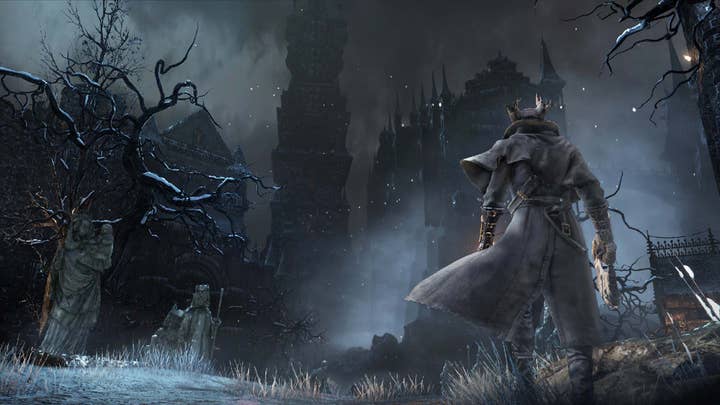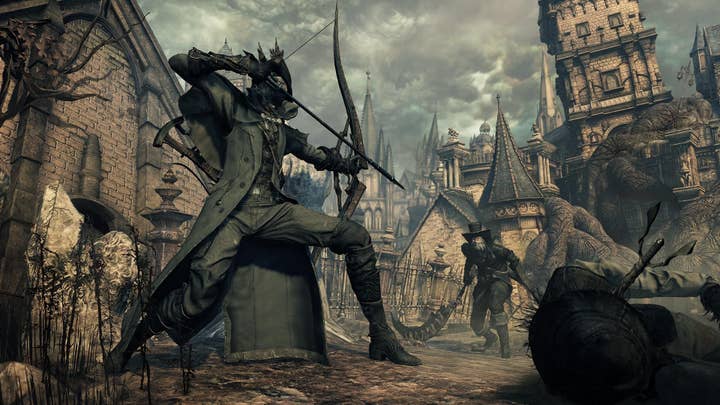PlayStation's low-key PC experiment | Opinion
Rumours of more PS4 exclusive titles following Horizon: Zero Dawn to PC have been squashed, but is that the end of Sony's multiplatform strategy?
A minor drama played out in fast forward this week as listings for PC ports of a number of high-profile PlayStation exclusive titles -- notably first-party titles Bloodborne and Days Gone, but also Atlus' Persona 5 Royal -- were posted on Amazon France, rapidly followed by Sony's quashing of the rumours this sparked.
This is not the first time that a retail website has started up the rumour mill by speculatively listing a non-existent product, and it almost certainly won't be the last time either. But you can forgive those who chose to attach a little more credence to this particular retail listing than would usually be sensible, given that Sony has already broken with decades of company tradition by approving a PC port of PlayStation 4 exclusive Horizon: Zero Dawn, which is set to arrive in the coming months. Given that Horizon is on the way, doesn't it stand to reason that other PC ports are coming too? Perhaps not those Amazon France took a stab in the dark at, but surely Horizon can't just be a one-and-done arrangement.
Given that Horizon is on the way, doesn't it stand to reason that other PC ports are coming too?
If we take a step back from this, there's an interesting broader question in play here about Sony's strategy regarding the PC platform -- specifically about what has led the company to a change of heart regarding the utility of, and reasoning for, putting major console exclusives onto PC. We're in an unusual position regarding the relationship between PC and consoles at present; there's a dichotomy between Microsoft, which is more or less committed to doing this with all of its titles due to its vision of Xbox as a platform which also encompasses some or all of the PC gaming experience, and at the other end of the spectrum Nintendo, which is about as likely to put its exclusives on PC as I am to win a gold medal in the Olympics this year.
There's a temptation to read Horizon: Zero Dawn's PC launch as Sony taking a somewhat cautious middle approach between those extremes -- but while that would create a pleasing symmetry, for sure, the reality is somewhat more complex.

To a large degree, I suspect that Horizon is an experiment; one designed to provide Sony with important data about the actual demand among PC players for major console exclusives they've thus far been unable to play, and designed to look not just at sales figures, but at what the impact on the franchise itself of making a key title available on PC will be.
Sales are vital -- sales are always vital -- but they're not the be all and end all of what Sony needs to see here. Even if Horizon sells like gangbusters on PC, the response to that data point isn't going to be a straightforward flinging open of the PS4's exclusive library and a wave of PC ports for crown-jewel titles like Bloodborne, Spider-Man or God of War. The crucial question for Sony isn't actually "How well will these games sell on PC?" -- rather, it's "How well does launching these games on PC support PlayStation as a brand and a platform?", which does encompass the sales question but is a much more broad and complex set of criteria to fulfil.
Sales are vital, but they're not the be all and end all of what Sony needs to see here
There are two considerations here. Firstly and most importantly, Sony's major task this year is building major anticipation for PlayStation 5 and its exclusive line-up, so it's not unreasonable to read every other move the company makes in terms of how it supports that goal. Putting critically acclaimed titles that are a shoo-in for PS5 sequels onto other platforms could help to broaden the appeal of the platform; it's not a dissimilar approach to how the previous movies in a franchise often turn up on streaming services a few weeks before the next film arrives in cinemas, which is a strategy designed to maximise the audience for the new instalment.
In this case, Sony knows that people who play PC games mostly also play console games -- the people who think the whole "PC Master Race" thing isn't ironic are, thankfully, few and far between -- and it would very much like those people to be PS5 early adopters. Introducing that audience to strong franchises that will continue as PS5 exclusives is potentially a canny move; it isn't hard to imagine that a strong performance for Horizon: Zero Dawn on PC could lead to an uptick in interest in the PS5 once the inevitable sequel is announced. That's one of the key data points Sony will be watching for.

The second major consideration is that Sony is hedging its next-gen bets to a certain extent with PlayStation Now. It's hard to say for sure how deeply Sony actually believes in game streaming as The Future -- the fact that it seems to have largely ceded constructing the infrastructure to Microsoft suggests that it isn't totally sold on the concept -- but regardless, it has a finger in that pie just in case. If that area of Sony's business is to succeed, it's going to require winning over people who aren't PlayStation owners to the streaming service, so here, too, establishing exclusive franchises with new audiences is a potentially valuable investment in the future of the business.
The next step after Horizon doing decently on PC won't be "unleash the exclusives"
It should go without saying that Horizon's PC sales matter, because it needs to sell well for any of those objectives to be met. But even if it does sell well, Sony is going to want to step back and see what impact that actually has on the franchise itself and the willingness of PC players to consider engaging more with the PlayStation brand and platform. As a result, the next step after Horizon doing decently on PC won't be "unleash the exclusives," because what Sony needs to accomplish here isn't just getting some long-tail revenue from its games by selling copies to PC owners -- there is a much broader strategy in play.
Horizon itself was likely chosen as Sony's first greenlit PC title because it's a shoo-in for that strategy; it's critically acclaimed (to my mind, it's head and shoulders the best new IP Sony created this generation), it's almost certainly going to have a major sequel early in the PS5's lifespan, but as a new IP it lacks strong recognition outside the PlayStation market. That lines up with the theory that Sony wants to test here -- that pushing a game like this out into a different market strengthens the franchise much more than it undermines the exclusivity of the PlayStation platform.
That logic doesn't hold to the same degree for a lot of the company's other titles. A game like Spider-Man, for example, doesn't have the same incentives, since the IP is already so familiar to almost all consumers. A similar though perhaps less persuasive argument can be made for God of War and various other ongoing franchises. That's not to say that these games won't come to PC if Horizon does well; merely that the case for them is less clear-cut.
Sony's priorities as it ramps up to PS5 launch will drive those decisions, not just the size of the sales opportunity on PC. Until we've seen how Horizon actually performs, we shouldn't expect to see any more decisions like this being made in a hurry.

